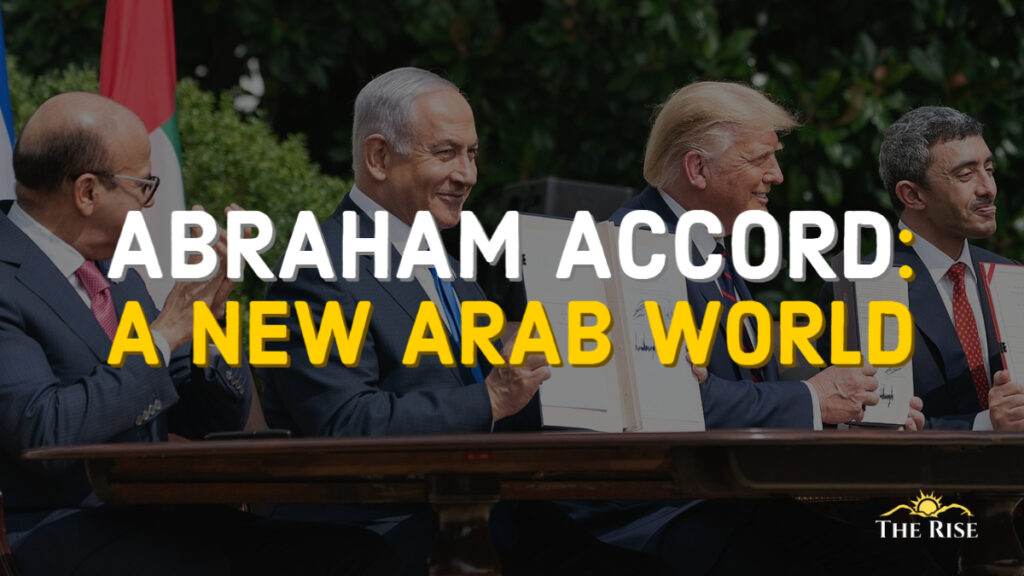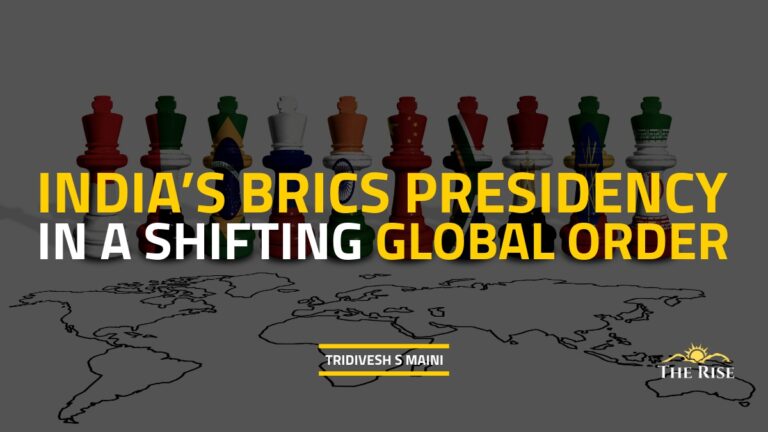Abraham Accord has great importance in the geopolitics of current times. In the process of consolidating global power, China is using its ‘debt-trap diplomacy’ to use some vulnerable states against the western alliance led by the U.S. This accord opens up strategic, economic and political opportunities to Israel, the Arab States, and other allies.
A massive strategic shift has happened in the middle-east with the Arab nations normalizing their ties with Israel. In a historic ceremony organized on the South Lawn of the White House on September 15, 2020, an agreement called the Abraham Accord was signed between Israel, The United Arab Emirates (UAE), and Bahrain. These nations can now have close cooperation in the areas of business, technology, and security. U.S President Donald Trump, who played an instrumental role in reaching to this agreement, later announced that in due course of time another seven to nine Arab nations were to establish diplomatic channels with Israel. This agreement, hailed as a masterstroke by the diplomatic community, is directly aimed at Iran which is antagonistic to the interests of both the Arab nations and Israel.
This agreement, hailed as a masterstroke by the diplomatic community, is directly aimed at Iran which is antagonistic to the interests of both the Arab nations and Israel.
The struggle for dominance
The Arab world is deeply affected by the Sunni-Shia conflicts which date back to centuries ago. But now the rivalry has reached that point where a breakdown in the Islamic world is imminent. Saudi Arabia is the undisputed leader of the global Muslim community. But their position is under a challenge from a block of Muslim nations led by Iran and Turkey. Iran is accused of funding Houthi rebels in Yemen and Hezbollah in Lebanon.
While, on one hand, Saudi Arabia, under the crown prince Mohammad Bin Salman, is slowly opening up its society, Turkey, on the other hand, is embracing orthodoxy under the watch of its President Recep Tayyip Erdogan. The unending civil war in Syria & Libya and the ongoing refugee crisis have also added to the chaos.
Also Read: UN@75: Libya’s Humanitarian Crisis
Iran’s involvement in the region has always generated curiosity in Washington. The U.S., throughout these years, was in friendship with both Israel and Saudi Arabia. Due to the Palestinian issue, the Islamic bloc led by Saudi Arabia couldn’t secure formal diplomatic ties with the Zionist state. Iran’s proximity to global terrorist organizations is well known. Hezbollah, which operates from Lebanon against Israel, is a Shia militia controlled by Tehran. Houthis are Iran’s proxies against Saudi Arabia. They also fund terrorist organizations like the Hamas and the Islamic Jihad in Palestine.
The emergence of an alternative bloc against the hegemony of Saudi Arabia became one of the reasons for Abraham Accord.
Saudi also accuses Qatar of giving funds to global terrorists. Qatar reciprocates the same charges against Riyadh. Meanwhile, Erdogan, the incumbent President of Turkey, dreams of leading the Islamic world through the lines of the old Ottoman Empire with the backing of Pakistan and Malaysia. The emergence of an alternative block against the hegemony of Saudi Arabia, hence, became a reason for Abraham Accord.
The Chinese Angle
China is trying to enter every geographical terrain by utilizing its Belt & Road Initiative and debt-trap diplomacy. Due to the strategic interferences by the United States, China couldn’t exploit the middle-east the way they had hoped. But, recently China announced a $400 billion trade deal with Iran, confirming China’s access to the Persian Gulf. This trade deal could even hurt India since the development of the Chabahar port in Iran is of high strategic significance to India.
Also Read: The Iran–China 25-years Deal: Where does it leave India?
The growing rift within the Organisation of Islamic Cooperation (OIC) can be attributed to Chinese influence. On multiple occasions, both Pakistan and Turkey had raised the Kashmir issue at various global platforms. But the issue was never taken seriously by the other prominent members of OIC. Since China cannot exert its power on the OIC in entirety, it should be trying to split the organization. With overambitious leaders like Erdogan and Imran Khan leading the rebel faction, Beijing can use this organization as a pawn against India and its allies. Seeing these possibilities, India became one of the first nations to endorse Abraham Accord.
The growing rift within the Organisation of Islamic Cooperation can be attributed to Chinese influence.
‘Dawn of Middle East’
An enthusiastic Trump called Abraham Accord the “dawn of new middle east”. For him, this deal was a major achievement just weeks before the American Presidential election. But for the Middle Eastern region, closer cooperation between Israel and the Arab nations can generate a plethora of opportunities.
In 1979, Egypt became the first Arab nation to recognize Israel. It was followed by Jordan in 1994. Abraham Accord was the first friendship treaty signed in 26 years. Abraham is regarded as the common patriarch of Semitic religions (Judaism, Christianity, and Islam) and, as the name itself signifies, the treaty emphasizes mutual trust and respect for each others’ faith. This agreement stops the annexation of the West Bank by Israel and is seen as a great leap towards a two-nation solution, hence ending the ongoing confrontation between Israel and Palestine.
This agreement stops the annexation of the West Bank by Israel and is seen as a great leap towards a two-nation solution, hence ending the ongoing confrontation between Israel and Palestine.
The economic and security benefits that Israel offers have influenced the Arab nations to come closer to Jerusalem. People from these nations can now travel freely to each other’s domain, hence increasing the exchange of culture and more opportunities in tourism. The Jewish state is known for its scientific advancement and close ties with the U.S. COVID-19 pandemic has made the Arab world realize that their complete reliance on oil is vulnerable.
If Arab nations can make an intelligence-sharing agreement with Israel, they can use the inputs from Mossad to defuse any of the misadventure of their adversaries. This will also allow close monitoring of those nations which are accused of aiding global terrorist organizations.
If India can lead military or naval exercises involving Israel and the Arab nations, it can send a loud message to China which is materializing the strategy to isolate India in the Indian Ocean Region with the doctrine of ‘String of Pearls’.
Through Abraham Accord, the Arab world has de-hyphenated its relationship with Israel. Hence, from now on, their engagements with Israel wouldn’t be affected by their ties with Palestine. India too can use the Israel-Arab ties to further consolidate its position in the Persian Gulf. If India can lead military or naval exercises involving Israel and the Arab nations, it can send a loud message to China which is materializing the strategy to isolate India in the Indian Ocean Region through the doctrine of ‘String of Pearls’. The accord also foils the attempts of Turkey and Pakistan to turn the Islamic world against India on the Kashmir issue. With more Arab nations expected to formalize their ties with Israel, Abraham Accord will have a greater impact in the Middle East, leading to the region’s peace, stability, and prosperity.
Also Read: Indian Ocean and South China Sea: Jugular Vein as Gordian Knot
Disclaimer: The views expressed in this article are of the author solely. TheRise.co.in neither endorses nor is responsible for them.
About the author
The writer is a political analyst and holds a masters degree in History from the Department of History, University of Hyderabad, India. He writes articles on topics pertaining to International affairs, History and Indian politics.









Pingback: I2U2 and its Significance in the Indo-Pacific - TheRise.co.in
Pingback: Saudi Arabia and UAE: Playing the Balancing Act - TheRise.co.in